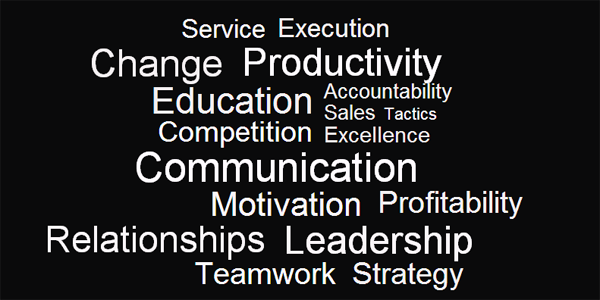
“It takes much more than a great product or service and a smart competitive strategy to be successful in today’s business world. Instead, success requires the concentrated effort and support of everyone in your company. Your entire work force be must accountable, not only to management, but also to each other. When your people are accountable your organization will have a competitive edge.
Why is accountability so vital?
Accountability throughout the entire organization is critical to its success or failure. All executives, managers, supervisors and, even staff, are responsible for the final outcome of the company. Since any effort is only as strong as its weakest link, the savvy organization depends upon and enhances the ability of its people to work together and to share accountability to achieve its short and long term goals. Smart companies know that in this economy, accountability is necessary for its prosperity and survival.
Accountable organizations are productive because employees work together with a shared vision toward a common goal. This culture gives the companies the competitive edge while increasing the opportunities for long term business growth.
Accountability—harder than it looks
The challenge for many organizations is to communicate the importance of accountability, as well as to create an acceptance of the concept. Today, this is often referred to as “buy-in.”
Unfortunately, sometimes employees and managers don’t fully understand its meaning. In simple terms, accountability means that employees will do what needs to be done, do it well, and will ultimately take ownership for their role in the process. In essence, they will act as though it is their company and will routinely practice “entrepreneurial thinking.” They will work together as a team, are supportive of one another, and display initiative beyond their job description. Most important, they will work together for the betterment of the organization; they understand that they not only answer to management for their performance, but also to each other. They hold their colleagues accountable for their attitudes, as well as their level of internal and external customer service.
Proving yourself by being accountable
If you are not in a management position, but want to make yourself valuable to your company, demonstrate accountability to those around you. If you are in a leadership position and want to instill a culture of accountability in your company, you need to create an understanding and acceptance of accountability as a vital part of your culture. The following are basic guidelines for assuming an “accountable” attitude:
Actions of an accountable leader:
- Take responsibility for positive results
- Communicate your vision, mission, strategy, values and goals
- Implement change necessary for survival and success
- Take ownership to handle and solve problems
- Consistently seek ways to be a better leader
- Know you are liable for final results
- Consistently strive for a flawless customer experience
- Recognize and build talent
- Execute your competitive strategy
Actions of an accountable sales pro:
- Take the initiative to possess industry knowledge and superior selling skills
- Be a master of your product or service and an expert in your industry
- Work harder than your competitors to build relationships
- Be a trusted advisor, and the “Go-To” person to your customer
- Take responsibility for the sales results
- Understand that, while sales may play the starring role, others are working hard behind the scenes
Actions of an accountable employee:
- Support the organization and its various teams
- Participate actively on a day-to-day basis
- Ensure that your voice is heard when issues arise
- Never assume a “not my job” attitude
- Look for opportunities to be creative in your job
- Provide exceptional service to your team as well as your customers
The Rules of Accountability
1. Define the meaning of accountability to your staff and ask them what it means to them.
2. Clarify the areas in which people will be held accountable. Expectations must be stated in a specific and clearly differentiating manner. To accomplish this, you must define precisely whatever old behaviors or attitudes must be abandoned, Then, define precisely what new behaviors must be exhibited on a consistent basis.
3. Be prepared for confrontation and conflict. Many managers prefer to avoid making their subordinates (and themselves) uncomfortable. Failure to confront poor performers or people with negative attitudes (if you have read my book, “Wake Up and Smell the Competition,” I refer to them as “Slackers”) can stifle productivity. If people are not held accountable for their job responsibilities and their interaction with managers, customers and coworkers, service excellence cannot exist.
In your efforts to establish accountability, keep this in mind: you will never succeed if your people are not made to feel valued by being treated well. Management must consistently model fairness, integrity, leadership, and concern. Unfair treatment destroys morale. Your leadership team must be extraordinarily responsive to the needs of your people. In addition, the company must do everything it can to help employees in their jobs. Treat them with respect and appreciate their efforts on a daily basis. Then, you will be able to sustain the momentum you need to maintain a culture of accountability and service-excellence throughout your organization.
Being accountable—not just a way of work, a way of life
There is no real mystery when it comes to acting in a responsible, accountable way. It is something everyone has been trained to do all his or her life. Responsible, mature actions must simply move beyond everyday life and into the work day. The rules of accountability may sound familiar, but they are so often forgotten when management and staff operate within the stress of today’s business environment.
Let’s not forget to:
- Always follow through. Do what you say you will do, when you say you will do it.
- Always be aware of the big picture—the company’s goal.
- Take responsibility for your attitude—to your colleagues, your job, and your customers.
- Your company needs your ideas and creativity. Strive to show initiative beyond your job description.
And finally, always treat others as you would like to be treated.

